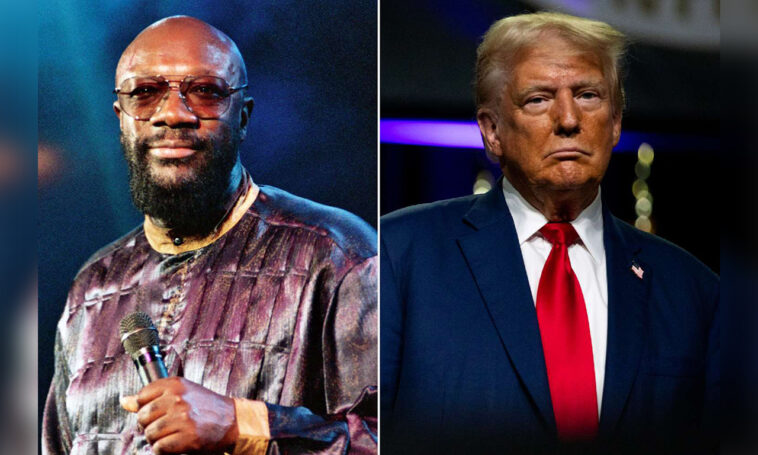The family of the late music legend Isaac Hayes has successfully taken legal action against the Trump campaign for using his classic song “Hold on, I’m Coming” during political rallies. The dispute, which centers on the unauthorized use of Hayes’ music, reached a turning point on September 3, when a U.S. District Judge ruled that the campaign must cease playing the song, which Hayes co-wrote and released in 1966. The court’s decision represents a significant victory for the Hayes family, who viewed the use of the song as an issue of both copyright infringement and moral character.
For some time, the Trump campaign had used “Hold on, I’m Coming” as exit music at various events, including the Republican National Convention in July. According to People, the song’s frequent use in this context prompted the Hayes family to file a lawsuit in the same month, arguing that it constituted copyright infringement. The lawsuit not only sought to prohibit future use of the song but also requested the removal of any videos that featured the music. The Associated Press reported that while the court granted a temporary injunction preventing further usage, it did not mandate the removal of existing footage.
Despite this partial setback, the Hayes family expressed gratitude for the ruling. “We are very grateful and happy for the decision by Judge Thrash,” said Isaac Hayes III, the son of the late artist, in a statement to Forbes. He underscored the importance of the ruling, stating, “Donald Trump has been barred from ever playing the music of Isaac Hayes again. I couldn’t ask for a better decision.” Hayes III also used the occasion to encourage other artists to take similar action if they find their work being used without consent at political events, urging them to continue fighting for their rights and the integrity of their creative output.
The conflict over the use of Isaac Hayes’ music has been simmering for years. In fact, Isaac Hayes III had previously filed a cease-and-desist letter when the Trump campaign used “Hold on, I’m Coming” at an NRA convention in 2022. For the Hayes family, the issue is not solely about political differences but rather about the character and values associated with the Trump campaign.
“I’ve never wanted this song to be associated with Donald Trump in the manner that he was using it,”
Hayes III explained. He went on to emphasize his father’s legacy, saying, “My father was a father to seven daughters… Donald Trump has been found liable of sexual abuse. I know my father would not want that man playing his music. Some of the things he says about women, especially Black women and women of color, especially in this election… We have to take a stand that we want to separate ourselves from someone with Donald Trump’s character. This is not a political issue; this is a character issue.”
While the ruling is a significant step for the Hayes family, the Trump campaign’s response suggests they are untroubled by the decision. Trump’s attorney, Ronald Coleman, appeared dismissive of the ruling, indicating that the campaign had already agreed to cease using the song. “The campaign has no interest in annoying or hurting anyone, and if the Hayes family feels that it hurts or annoys them, that’s fine; we’re not going to force the issue,” he commented.
This latest development adds to a growing list of artists who have objected to their music being used in political campaigns without permission. Hayes III’s actions and statements may embolden other artists to take legal action to protect their work, especially when they feel it is being associated with causes or figures they do not support. The ongoing debate over intellectual property rights in the realm of political campaigning highlights a broader cultural conversation about the use of creative works in contexts that may conflict with the creators’ values or intentions.
The Hayes family’s victory may not be the last word in this conflict, but it certainly sets a precedent for other artists who wish to protect their intellectual property and maintain control over how their art is used. It also emphasizes the importance of consent and respect for the creative community, reminding the public that the use of music is more than just a backdrop; it is a powerful medium that carries the weight of the artist’s voice, intent, and legacy.







Join the Community and Be a Part of the Conversation
You must be logged in or registered to post a comment.